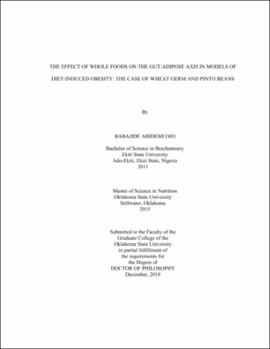| dc.contributor.advisor | Lucas, Edralin A. | |
| dc.contributor.author | Ojo, Babajide Abidemi | |
| dc.date.accessioned | 2022-01-09T19:51:53Z | |
| dc.date.available | 2022-01-09T19:51:53Z | |
| dc.date.issued | 2019-12 | |
| dc.identifier.uri | https://hdl.handle.net/11244/333670 | |
| dc.description.abstract | The global alteration in food supply characterized by increased western-style diets (high in saturated fat and refined sugar) is a major driver of the obesity epidemic. Western diets disrupt the host-gut bacteria homeostasis, which elevates intestinal permeability to initiate obesity-related insulin resistance and adipose tissue inflammation. Dietary enrichment with fiber and more recently, tryptophan may mitigate these detrimental effects of obesity. Thus, the addition of whole foods to the western dietary pattern may be a convenient and cost-effective means to mitigate the damaging impact of obesity. The studies herewith were designed to understand the effect of two whole foods - wheat germ (WG) and pinto beans (PB) - on the gut bacteria and intestinal defenses against diet-induced obesity. In addition, the implication on glucose homeostasis and adipose tissue inflammation was examined. Results showed that WG only increased the abundance of taxa within the Lactobacillaceae family. PB had a robust effect on the gut bacteria, by increasing the abundance of Lachnospiraceae, and suppressing taxa within the Tenericutes and Proteobacteria phyla. Feeding a western-style diet consistently weakened signal transducer and activator of transcription (STAT)3 activation in the small intestine. However, both WG and PB reversed this effect potentially through different mechanisms involving interleukin (Il)-22 and butyrate, respectively. Consequently, STAT3-induced antimicrobial peptide genes (Reg3B and Reg3y) were significantly upregulated by WG and PB. In the adipose tissue, WG suppressed nuclear factor kappa-light-chain-enhancer of activated B cell (NFKB) activation by the western diet, and downregulated Il-6 and lipopolysaccharide binding protein genes. PB suppressed the expression of tumor necrosis factor (Tnf)-a gene and the pro-inflammatory M1 macrophage marker, inducible nitric oxide synthase (iNos), in the adipose tissue. Finally, both WG and PB improved glucose homeostasis in the animals fed a western diet. These studies show that the restoration of STAT3 activation in the small intestine is central to the gut-protective abilities of WG and PB albeit through separate mechanisms. Furthermore, these studies provide valuable foundational insights that should be considered for future studies that aim to identify the benefits of whole foods on gut and peripheral tissues using western diet-induced models of obesity. | |
| dc.format | application/pdf | |
| dc.language | en_US | |
| dc.rights | Copyright is held by the author who has granted the Oklahoma State University Library the non-exclusive right to share this material in its institutional repository. Contact Digital Library Services at lib-dls@okstate.edu or 405-744-9161 for the permission policy on the use, reproduction or distribution of this material. | |
| dc.title | Effect of whole foods on the gut-adipose axis in models of diet-induced obesity: The case of wheat germ and pinto beans | |
| dc.contributor.committeeMember | Smith, Brenda | |
| dc.contributor.committeeMember | Clarke, Stephen | |
| dc.contributor.committeeMember | Chowanadisai, Winyoo | |
| dc.contributor.committeeMember | Ritchey, Jerry W. | |
| osu.filename | Ojo_okstate_0664D_16549.pdf | |
| osu.accesstype | Open Access | |
| dc.type.genre | Dissertation | |
| dc.type.material | Text | |
| dc.subject.keywords | gut microbiome | |
| dc.subject.keywords | inflammation | |
| dc.subject.keywords | obesity | |
| dc.subject.keywords | pinto beans | |
| dc.subject.keywords | type 2 diabetes | |
| dc.subject.keywords | wheat germ | |
| thesis.degree.discipline | Nutritional Sciences | |
| thesis.degree.grantor | Oklahoma State University | |
